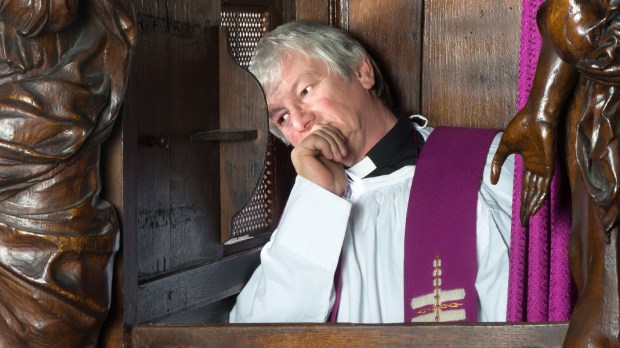Jesus Christ instituted the sacrament of confession, giving his apostles the ability to “bind and loose,” thus reconciling sinners with God and the Church (cf. Matthew 16:19).
To clarify, priests do not forgive sins! Only God can forgive sins!
Only God forgives sins. Since he is the Son of God, Jesus says of himself, “The Son of man has authority on earth to forgive sins” and exercises this divine power: “Your sins are forgiven.” Further, by virtue of his divine authority he gives this power to men to exercise in his name.
CCC 1441
However, Jesus uses the Church as his instrument of reconciliation in the world.
The Church, who through the bishop and his priests forgives sins in the name of Jesus Christ and determines the manner of satisfaction, also prays for the sinner and does penance with him. Thus the sinner is healed and re-established in ecclesial communion.
CCC 1448
The sinner is reconciled both with God and the Church in the sacrament of confession.
Sins a priest can’t absolve
Since the sacrament has that two-fold aspect to it, there exist certain sins that require extra acts of reconciliation with the Church.
Certain particularly grave sins incur excommunication, the most severe ecclesiastical penalty, which impedes the reception of the sacraments and the exercise of certain ecclesiastical acts, and for which absolution consequently cannot be granted, according to canon law, except by the Pope, the bishop of the place or priests authorized by them. In danger of death any priest, even if deprived of faculties for hearing confessions, can absolve from every sin and excommunication.
CCC 1463
These sins require extra steps, as the sin itself is grievous and is very harmful, especially to the Church. In order to repair the damage done, the penitent needs to seek reconciliation with his/her local bishop, or even the Vatican for more serious crimes.
Here are a few examples the Code of Canon Law gives for sins that excommunicate and need additional steps of reconciliation. There are many more not listed here.
Abortion used to be on this list, but Pope Francis now permits any priest to absolve individuals who procure an abortion.
1Priests who sexually abuse minors and adults
A priest who in the act, on the occasion, or under the pretext of confession solicits a penitent to sin against the sixth commandment of the Decalogue is to be punished, according to the gravity of the delict, by suspension, prohibitions, and privations; in graver cases he is to be dismissed from the clerical state.
Can. 1387
A cleric who in another way has committed an offense against the sixth commandment of the Decalogue, if the delict was committed by force or threats or publicly or with a minor below the age of sixteen years, is to be punished with just penalties, not excluding dismissal from the clerical state if the case so warrants.
Can. 1395
2Profaning a Consecrated Host
A person who throws away the consecrated species or takes or retains them for a sacrilegious purpose incurs a latae sententiae excommunication reserved to the Apostolic See; moreover, a cleric can be punished with another penalty, not excluding dismissal from the clerical state.
Can. 1367
3Physically assaulting a priest, bishop or pope
A person who uses physical force against the Roman Pontiff [as well as a bishop or priest] incurs a latae sententiae excommunication reserved to the Apostolic See.
Can. 1370



